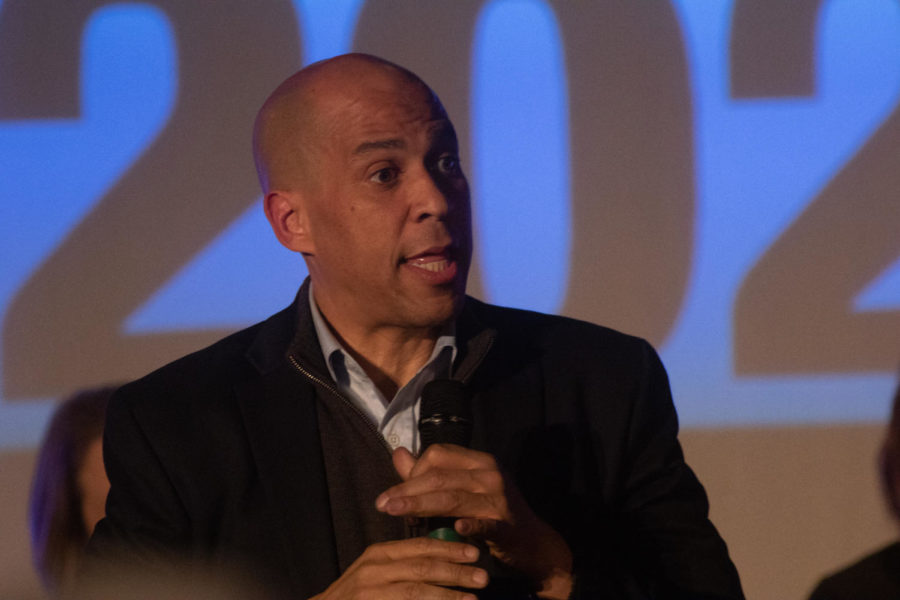Booker talks education, housing affordability
Chris Jorgensen/Iowa State Daily
Democratic presidential candidate Cory Booker of New Jersey speaks at the Kum & Go Theater in Des Moines on Feb. 9.
March 17, 2019
As another round of tuition increases looms over Iowa State, presidential hopeful Sen. Cory Booker joined Working Hero Iowa’s founder and state director for a town hall to discuss issues facing low-income Iowans.
Booker told voters about his plans for education, housing, labor and unity during his speech Sunday at Prairie Moon Winery.
Booker told the crowd of more than 250 people that he supports offering more apprenticeship programs and “debt-free” college rather than “free college.”
“This is the problem I have with people who want to say ‘free college,’ … Only 35 percent of our kids go to college,” Booker said. “What about all those other kids who deserve not just pathways to prosperity, but wide, well-paved avenues to careers?”
Kaleb Van Fosson, an Ames resident and activist, said he agrees with an increased focus on vocational and technical training but described Booker’s stance on college affordability as a way of “weasling out of supporting tuition-free [college].”
“He didn’t give any specifics on how he would make [college] debt-free,” Van Fosson said. “It seemed more like a platitude than an actual, substantive policy.”
Ross Wilburn, diversity officer for ISU Extension and Outreach, said he appreciated Booker’s “emphasis on multiple avenues in education, not just colleges and universities.”
More than half of Iowa’s college students, 50. 6 percent, are enrolled in a community college according to the Iowa Department of Education’s 2018 Condition of Community Colleges report. While the number of career and technical education programs has increased by an average of 20.8 per year for the last five years, the number of award options for these programs has decreased and tuition has risen.
Dozmen Lee, a senior in political science, said he enjoyed much of what Booker said in his speech, such as his allowing college debt forgiveness for teachers and combating rising pharmaceutical prices, but didn’t believe he spoke enough about issues affecting students.
“I wish he had touched more on things like free college or maybe reparations,” Lee said. “What is he going to do for the students? He came to Ames, a college town, and it seems like he didn’t focus too heavily on the students.”
Along with rising tuition costs, Booker spoke about housing affordability, referencing studies that found “homelessness is more expensive than housing” for taxpayers.
“We have laws that are designed to make people suffer, strip people of dignity, and we end up paying more for it because our jails are our biggest mental health institutions in this country,” Booker said. “Our jails are where we treat addiction. Our jails are where we treat poverty. We have a nation that treats you better if you’re rich and guilty than if you’re poor and innocent.”
Lee, who also serves as Student Government’s director of residency, said he appreciated how Booker spoke about housing.
“It’s a lot more expensive to treat poverty and homelessness than it is to keep people sheltered,” Lee said. “Personally, I think housing is a fundamental right … I like the fact that he touched upon that and helping people struggling with mental illness and addiction by housing them.”
Working Hero Iowa aims to raise awareness of the earned income tax credit, which Booker has worked to expand and raise awareness of throughout his career in politics.
During his speech, Booker often referenced money “left on the table” by families who weren’t aware of the credit and a desire to help low-income families receive their full potential credit, restore the “dignity of labor” and more accurately address what poverty looks like in America.
“That poverty line is fake,” Booker said. “It’s from the statisticians in Washington. I can tell you people who are above the poverty line in New Jersey can’t afford to raise their family. What we know is that it costs over a trillion dollars to our economy to cover the costs of poverty.”
However, when an attendee asked Booker what the “nation’s greatest crisis right now” is, he discussed a multitude of issues, such as poverty and climate change, before settling on the one he said is the greatest problem: divisiveness.
“I don’t think there’s a problem that we can’t solve in America,” Booker said. “American history is a perpetual testimony to the achievement of the impossible, but in order to do that we need to revive a sense of civic grace. We need to have more courageous empathy so we see each other struggling and hurting. We need to understand that patriotism is love of country, and you cannot love your country unless you love your fellow countrymen and women.”
Wilburn, who ran for governor in 2018’s Democratic primary, said he enjoyed Booker’s message of unity.
“We can and must work together because that’s when we’ve made progress,” Wilburn said.







